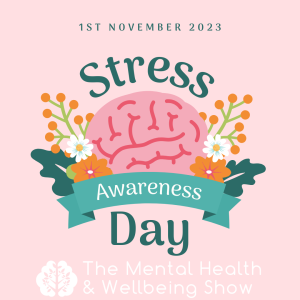
What is National Stress Awareness Day?
National Stress Awareness Day takes place on the first Wednesday in November, every year. This day represents an opportunity to think about the effects of stress on our physical and mental health, as well as making us aware of how we deal with the feelings of stress.
There can be many triggers for stress, be it work-deadlines, shifts in our relationships, or self-imposed pressures. At times, stress can serve a constructive purpose, acting as a catalyst to prompt us to address issues or accomplish tasks. Although, stress can build over-time, and without.
Although, there are instances when stress can accumulate, turning into a period of prolonged stress, which can then begin to significantly affect our well-being, making us feel overwhelmed. It’s during these moments that we must assess the mental and physical toll of stress on our lives.
The Effects of Stress
Stress can impact our well-being in many ways. In some instances, it can cast a shadow over the joy of living, leaving us grappling with racing or foggy thoughts. Feelings of being overwhelmed, anxiety, irritability, or confusion may take hold. Physical manifestations, such as headaches or migraines, can also emerge due to stress. Additionally, many individuals find themselves making significant adjustments to their behaviour and responses when confronted with stressful situations.
The effects of stress extend beyond the realm of mental well-being and can take a toll on our physical health as well. Prolonged stress can lead to a cascade of physiological responses in the body, including the release of stress hormones like cortisol, leading to increased blood pressure, heart rate, and a weakened immune system. Over time, chronic stress raises the risk of cardiovascular diseases, digestive problems, and susceptibility to infections. Additionally, it can manifest as headaches, muscle aches, and sleep disturbances, highlighting the intricate link between mental and physical well-being.
Recognising the signs of stress is vital. Changes in mood, sleep, irritability, or physical discomfort can signal stress. Acknowledging these cues enables effective stress management for better well-being.
Start Carving Out Time for Yourself!
Making time for yourself is crucial when it comes to decreasing levels of stress that is accumulating in the body. Think of the things that you love to do to relax. If it’s been a while since you had any relaxation time, ask your yourself what did you always love to-do during a time of relaxation or enjoyment. Maybe it’s time to try some new activities!
Some recommendations include:
- Reading your favourite book
- Walking in nature
- Taking a bubble bath or adding your favourite essential oils
- Catching up on sleep
- Listening to an educational podcast to boost your knowledge in a topic you’ve always wanted to learn about
- Call a friend you haven’t spoken to in a while
- Engaging in your favourite hobby (E.g., Playing an instrument, yoga etc)
- Cooking your favourite meal
- Listen to your favourite genre of music
- Start a meditation series
These are just a few general ideas to look into when you want some alone time to get back to who you truly are. The activities you chose to participate in should be super enjoyable and fulfilling. They require you to be present in the moment and to be fully engaged within them, bringing you back to your body and enjoying every moment. Allowing yourself to have this time will bring you back to a state of equilibrium, so you can perform at your best during busy periods.
It’s crucial to note, to not engage in something that’s too strenuous as the whole point is to slow down and engage in some relaxation time, to rest your mind, soul, and body.
To explore stress awareness further, please see our available courses. We invite you to explore the diverse range of courses we provide, offering valuable skills and insights in the realm of Stress Awareness.
Book yourself onto a course below!
These courses can be delivered via Zoom or Face to Face